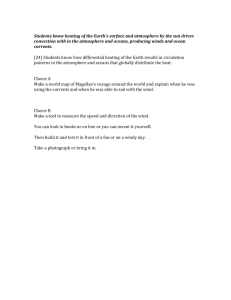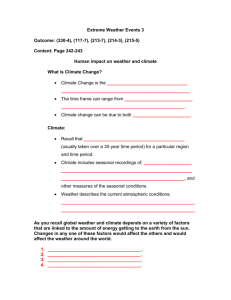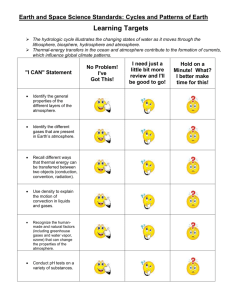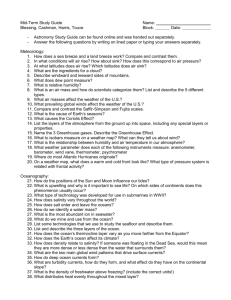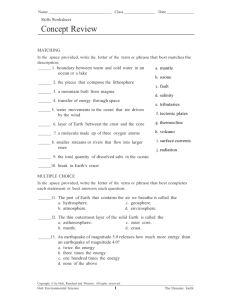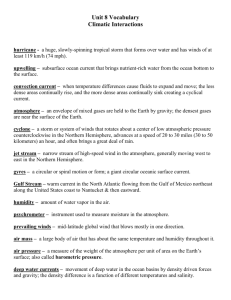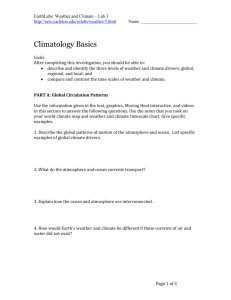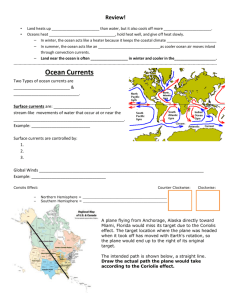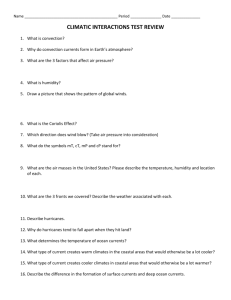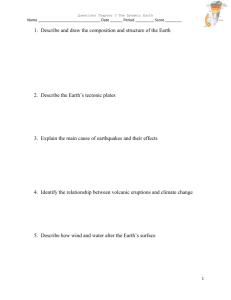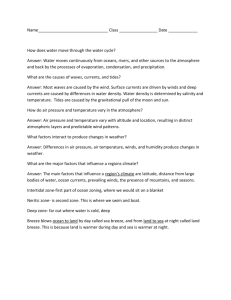Human impact on weather and climate
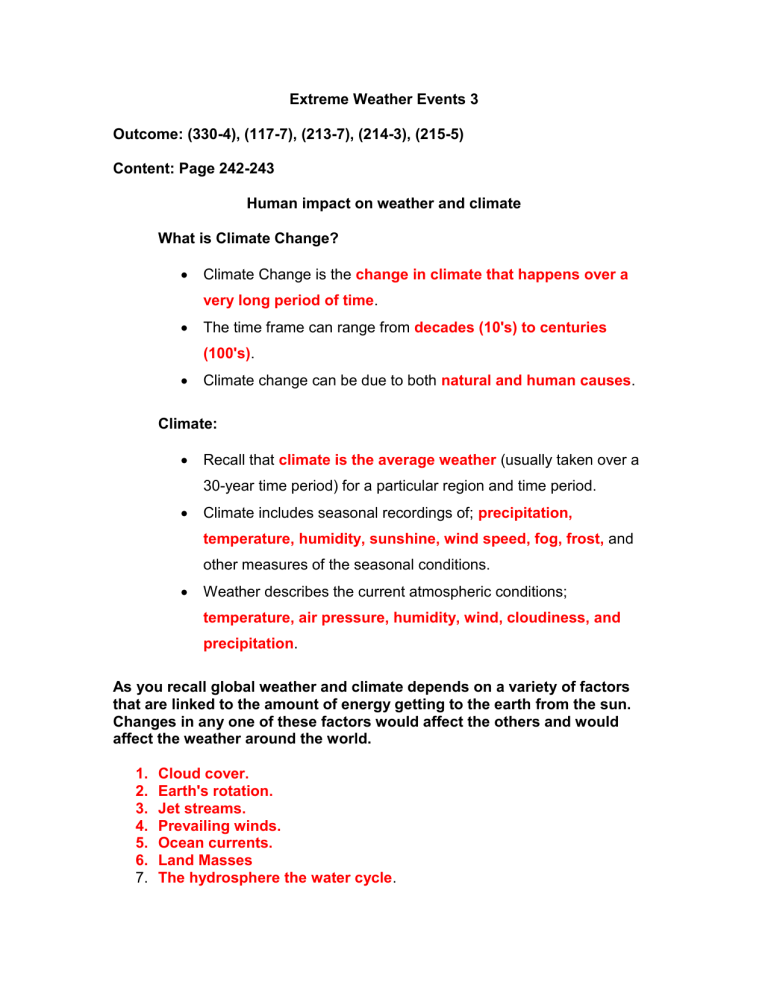
Extreme Weather Events 3
Outcome: (330-4), (117-7), (213-7), (214-3), (215-5)
Content: Page 242-243
Human impact on weather and climate
What is Climate Change?
Climate Change is the change in climate that happens over a very long period of time .
The time frame can range from decades (10's) to centuries
(100's) .
Climate change can be due to both natural and human causes .
Climate:
Recall that climate is the average weather (usually taken over a
30-year time period) for a particular region and time period.
Climate includes seasonal recordings of; precipitation, temperature, humidity, sunshine, wind speed, fog, frost, and other measures of the seasonal conditions.
Weather describes the current atmospheric conditions; temperature, air pressure, humidity, wind, cloudiness, and precipitation .
As you recall global weather and climate depends on a variety of factors that are linked to the amount of energy getting to the earth from the sun.
Changes in any one of these factors would affect the others and would affect the weather around the world.
1. Cloud cover.
2. Earth's rotation.
3. Jet streams.
4. Prevailing winds.
5. Ocean currents.
6. Land Masses
7. The hydrosphere the water cycle .
Natural Climate change:
The forces of nature and thus natural causes of global warming are completely out of our control .
Things like variations in the earth's orbit or the sun's activity could influence the length of seasons .
Earthquakes below the surface of the oceans could change the patterns of ocean currents .
Movement of the continents over thousands of years could change ocean currents and prevailing wind patterns .
Any one of these changes would influence and change global weather patterns .
Short-term natural causes of climate change would include such things as volcanic eruptions or major forest fires .
These events would increase the amount of greenhouse gases and dust in the atmosphere .
This would lead to increased cloud cover, which would affect the amount of heating by the sun and may shift wind patterns .
Large forest fires have been shown to have a short term and a long-term affect on the local climate.
You may have heard the phrase that forest fires make their own wind. This is true because the heat of the fire produces large convection currents, the heated air rises and cooler air rushes in to take its place . Hot, dry windy conditions with large amounts of smoke and dust contribute to the formation of clouds and dry lightning .
Years after the fire the areas burned bare of trees show increased heating by the sun until the trees grow back. Depending on the
size of the area burned this would have an effect on the local climate and the global climate .
Human causes of climate change:
Examples
The burning of fossil fuels for producing electrical energy, heating and transportation is changing the chemical make up of the atmosphere . The build-up of these greenhouse gases trap heat and reflect it back to the earth's surface .
The way land is used is changing too. Humans replace forests with agricultural lands, or natural vegetation with asphalt or concrete. This changes the way the Earth's surface reflects sunlight and releases heat . All these changes also affect evaporation, runoff and rainfall patterns .
Agriculture and industry activity is adding large amounts of tiny particles (aerosols) to the atmosphere . The fine particles contribute to the formation of clouds and precipitation .
All of these factors are combining to change our climate .
We are witnessing a rise in global temperatures .
Increased heating of the oceans and atmosphere is influencing ocean currents and prevailing wind patterns , which is believed to be causing more extreme weather events.
Impacts of Climate Change:
Here are some thoughts on the impact of global climate change. How will you be affected?
Climate change could affect the health of Canadians due to higher temperatures, more frequent storms, and increases in air pollution .
With warmer than usual temperatures we will see increased amounts of insect and water borne diseases that we would normally not see in our climates.
With more severe storms we would see increased damage to buildings and roads . Increased flooding would require spending millions building new dams and spillways .
Changed weather patterns could mean differences in how we enjoy the outdoors. Regular summer and winter activities would change significantly . Would it get to the point where we have to throw down our ice skates for roller blades?
Climate change may threaten sensitive ecosystems in Canada such as wetlands and permafrost areas . If ecosystems begin to change the biodiversity of the areas will change as well . What will happen to the polar bear if the climate of the north changes? What will happen to the
Atlantic puffins when ocean currents change?
Content: Page 241
Careers in the Weather
Meteorologists are people who study the weather.
To become a meteorologist you would need to attend a university .
Meteorologist usually can get jobs with government agencies that record and analyze weather and climate data .
In Canada this would be the Meteorological Service of Canada .
Others can get jobs with TV stations as weather reporters .
However many other jobs require you to have a good understanding of the weather and weather patterns. For instance if you are the captain of an offshore fishing vessel the ability to read the weather is important to the safety of the boat and crew . When you are hundreds of kilometres out to sea you need to be aware of changes in the weather well in advance .
Other careers that require a good understanding of weather would include pilots, fishermen, farmers, military, storm chasers, outdoor people, weather forecaster, forest fighters, hunting and fishing guides
Please explain why the following would require a good understanding of the weather?
Pilots:
Fisherman:
Farmers:
Military:
Storm Chaser:
Outdoor People:
Weather Forecasters:
Fire fighters:
Hunting and Fishing Guides:
